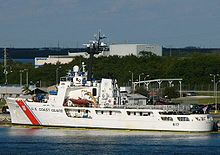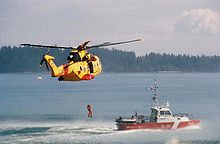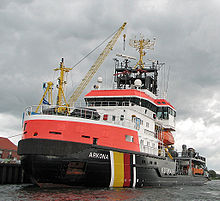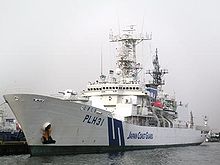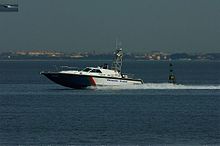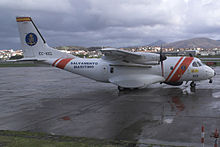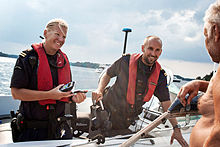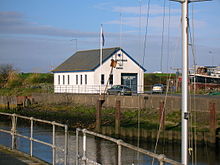- Coast guard
-
A coast guard or coastguard is a national organization responsible for various services at sea. However the term implies widely different responsibilities in different countries, from being a heavily armed military force with customs and security duties to being a volunteer organization tasked with search and rescue functions and lacking any law enforcement powers.
Role
Among the responsibilities that may be entrusted to a coast guard service are:
- search and rescue,
- enforcement of maritime law,
- safety of vessels,
- maintenance of seamarks and
- border control
During wartime, some coast guard organizations might have responsibilities in harbor defense, port security, naval counter- intelligence and coastal patrols.
The coast guard may, varying by jurisdiction, be part of the country's military, a law enforcement agency, or a search and rescue body. For example, the U.S. Coast Guard is a military branch with a law enforcement capacity, whereas the United Kingdom's Her Majesty's Coastguard is a civilian organisation whose only role is search and rescue.[1] Most coast guards operate ships and aircraft including helicopters and seaplanes that are either owned or leased by the agency in order to fulfill their respective roles.
Some coastguards, such as the Irish Coast Guard have only a very limited law enforcement role, usually in enforcing maritime safety law, such as by inspecting ships docked in their jurisdiction.[2] In cases where the coast guard is primarily concerned with coordinating rather than executing rescue operations, lifeboats are often provided by civilian voluntary organizations, such as the Royal National Lifeboat Institution in the United Kingdom, whilst aircraft may be provided by the countries' armed forces, such as Sea Kings operated by the RAF and Royal Navy in addition to any of the coast guard's own assets.
Type and role by country
The following lists a select number of coast guards around the world, illustrating the varied roles they play in the respective countries they operate in:
Argentina
The Argentine Naval Prefecture, in Spanish Prefectura Naval Argentina or PNA, is a service of the Argentine Interior Ministry charged with protecting the country's rivers and maritime territory. It therefore fulfills the functions of other countries' coast guards, and furthermore acts as a gendarmerie force policing navigable rivers.
Australia
While having 19,650 kilometres of coastline, Australia does not have a force purely to defend its coast. The duty of patrolling its coastline falls to the Royal Australian Navy, the Australian Customs (through its Border Protection Command division), and the Police services of the states.
In addition, there are several private volunteer coast guard organizations, the two largest organizations being the Royal Volunteer Coastal Patrol (established in 1937) and the Australian Volunteer Coast Guard (established in 1961). These volunteer organizations have no law enforcement powers, and are essentially auxiliary Search and Rescue services.
Bangladesh
The Bangladesh Coast Guard's officers are transferred from the Bangladesh Navy. While under the remit of the Ministry of Home Affairs, the coast guard is part of the country's military.[3]
Canada
In Canada, the Canadian Coast Guard (CCG) is a civilian service under the Department of Fisheries and Oceans responsible for patrolling the world's longest coastline of 243,042 km (~151,000 mi).[4]
The CCG holds responsibility for all marine search and rescue in Canada. The CCG coordinates search and rescue operations with the Canadian Forces, Royal Canadian Mounted Police, and other organizations. The CCG maintains and operates seamarks, coastal light stations, vessel traffic services, marine pollution response services, marine communications systems and provides icebreaking services. CCG also operates all federal scientific research and hydrographic survey vessels. To accomplish these tasks, CCG has a sizable fleet of vessels and aircraft, all serviced from various bases and smaller stations located on three coasts (Atlantic, Arctic, Pacific) and the Great Lakes and St. Lawrence River.[5]
The Canadian Coast Guard College is located near Sydney, Nova Scotia.
China (PRC)
See article: Chinese Coast Guard
The Peoples Republic of China operates several coast guard agencies. It is believed that in the near future, an integration of all these separate services would form a Chinese coast guard. In addition, these services operate their own small aviation units to assist their maritime patrol capabilities.
The China Coast Guard (Simplified Chinese: 中国海警) serves as a coordinating body for maritime search and rescue in the territorial waters of the People's Republic of China. The China Coast Guard is the maritime branch of the Public Security Border Troops, a paramilitary police force under the leadership of the Ministry of Public Security (MPS).
The China Maritime Safety Administration (Chinese: 中国海事局) is a government agency which coordinates maritime search and rescue in the territorial waters of the People's Republic of China. The CMSA is part of the Ministry of Transport.
The China Marine Surveillance (CMS), created on 19 October 1998, is a paramilitary maritime law enforcement agency of the State Oceanic Administration of the People’s Republic of China. The force is responsible for enforcing laws and order within China’s territorial waters, exclusive economic zones (EEZ), and shores, protect maritime environment, natural resources, navigation aids and other facilities, and carry out maritime surveys. In time of emergency, the force can also be deployed for other missions such as search and rescue.
The China Fisheries Law Enforcement Command (FLEC)(Chinese: 中国渔政) , an organ of the Fisheries Management Bureau under the PRC Ministry of Agriculture, is responsible for the enforcement of laws concerning fishing and maritime resources within PRC’s territorial waters and exclusive economic zones (EEZ). FLEC’s responsibilities include protecting Chinese fishing vessels and personnel, resolving disputes in fishing activities, preventing illegal fishing, and protecting maritime resources.
Taiwan (ROC)
In Taiwan, the Coast Guard Administration (ROCCGA) is both a military and a law enforcement organization. The ROCCGA is considered a civilian law enforcement agency under the administration of the Executive Yuan, though during wartime it may be incorporated as part of the military. Its primary roles are in ensuring the safety and security of the country's waters and coordinating search and rescue efforts.[6]
ROCCGA is instituted Maritime Patrol Directorate General and Coast Patrol Directorate General. Officers of Maritime Patrol Directorate General are law executors, but officers of Coast Patrol Directorate General are soldiers who have partial law-enforcement power.
France
In France, there are no Coast Guards, per se. But, in each region, a Naval Admiral, called Préfet Maritime, is in charge of coordination of all state services for action at sea (Navy, gendarmerie, customs, fishery survey ...). The charity, Société Nationale de Sauvetage en Mer, provides most life saving duties.
Germany
The German Federal Coast Guard, known as the Küstenwache, is both a civilian service and a law enforcement organisation, staffed with both police officers and certain civilians from the various German federal agencies associated with maritime administration with responsibility for the coordination of all law enforcement activities within its jurisdiction.[7]
Haiti
Main article: Haitian Coast GuardThe Haitian Coast Guard is an operational unit of the Haitian National Police. It is one of the few law enforcement organisations in the world to combine water policing and coast guard duties while remaining as a policing unit. It operates primarily as a law enforcement agency, with secondary responsibilities in search and rescue.
Hong Kong
In Hong Kong, law enforcement duties are carried out by the Marine Police and the Customs and Excise Department. The Hong Kong Maritime Rescue Co-ordination Centre (HKMRCC) co-ordinates search and rescue vessels, aircraft and other resources of the Fire Services Department, Government Flying Service, Marine Department and the Marine Police.
Iceland
The Icelandic Coast Guard has primarily been a law enforcement organisation but is also in charge of national defences. It has also involved with Iceland's contributions to expeditionary operations and conducted military exercises. For example Operation Enduring Freedom and Northern Challenge.[8]
India
In India, the Indian Coast Guard is a military unit and, in contrast with some coast guard units, resembles a naval coastal defence force. It has responsibility for search and rescue, enforcement of maritime law- smuggling, immigration and shipping regulations- and protecting the country's maritime and offshore resources[9]
Ireland
The Irish Coast Guard (IRCG) makes up one arm of the Maritime Safety Services, the other being the Maritime Safety Directorate. Both arms are due to merge into a new "one stop shop" Agency for all maritime safety matters. The purpose of the Irish Coast Guard is: To reduce the loss of life within the Irish Search and Rescue Region and on rivers, lakes and waterways and to protect the quality of the marine environment within the Irish Pollution Responsibility Zone, Harbours and Maritime Local Authority areas and to preserve property. To promote safety standards, and by doing so, prevent, as far as possible, the loss of life at sea and on inland waters and other areas, and to provide an effective emergency response service".
Italy
Main article: Corps of the Port Captaincies – Coast GuardIn Italy, the Guardia Costiera is part of the Italian Navy under the Ministry of Infrastructure and Transport. They have responsibility for enforcement of shipping and maritime safety regulations, as well as performing search and rescue duties[10]
Japan
In Japan, The Japan Coast Guard is under the oversight of the Ministry of Land, Infrastructure, Transport and Tourism, and is responsible for the protection the coast-lines of Japan.
Malaysia
In Malaysia, the Malaysian Maritime Enforcement Agency (MMEA) or Malaysian Coast Guard is part of the Malaysian Civil Service and is under the Prime Minister's Department. The Agency is headed by a Director General who is appointed by the Yang Di Pertuan Agong (King) on the advice of the Prime Minister while other personnel are appointed by the Public Service Commission. In times of war, crisis or emergency, the Agency may be placed under the command of the Malaysian Armed Forces. It was formed to combat the rise of piracy in the Malaccan and Moluccan straits, especially after frequent attacks from the Orang laut pirate during the 1900s. Personnel often work very closely with the Royal Malaysian Navy and Royal Malaysian Air Force. The Coast Guard operates a Special Forces Commando or STAR (Special Weapons and Tactics) unit, which was absorbed from the Navy's PASKAL and Air Force's PASKAU. The agency utilizes its resources in a maritime law enforcement and search and rescue capacity.[11]
Netherlands
The Netherlands Coastguard (Nederlandse Kustwacht) is a national organisation responsible for various services along The Netherlands' ocean coast line (mainly search and rescue services).
Netherlands Antilles & Aruba
Main article: Netherlands Antilles & Aruba Coast GuardThe Netherlands Antilles and Aruba Coastguard is the coast guard of the Netherlands Antilles and Aruba, both of which are protectorates of the Kingdom of the Netherlands.
New Zealand
The Royal New Zealand Coastguard is a civilian volunteer charitable organisation,[12] providing search and rescue services to coastal waterways and some lakes in New Zealand. Smaller incidents are coordinated by the New Zealand Police, who may call on the services and resources of the coastguard. Larger incidents are managed by the Rescue Coordination Centre New Zealand (RCCNZ), with support from the New Zealand Defence Force.[13]
Norway
The Norwegian Coast Guard, or Kystvakten in Norwegian, is a part of the Royal Norwegian Navy, but has separate vessels, many of which are purpose-built. Coast guard vessels have the prefix KV. Four of these vessels are capable of embarking one or more helicopters. Norway's exclusive economic zone, the Coast Guard's area of responsibility, is about 2.2 million square kilometers, the largest in Western Europe.
Pakistan
In Pakistan, the Pakistani Coast Guard is the youngest of the nation's armed forces. It is a military force in its right, as opposed to being part of the Pakistan Navy. The coast guard has responsibilities for protecting and the country's coastlines in terms of strategic security, as well as law enforcement within the country's Exclusive economic zone.[14]
Philippines
In the Philippines, the Philippine Coast Guard (PCG) is a maritime law enforcement agency operating under the Department of Transportation and Communications of the Philippine government. It is tasked with the broader enforcement of maritime laws, especially against smuggling, illegal fishing, drug trafficking, and piracy. It patrols the country's 36,289-kilometer coastline, and is also involved in maritime search and rescue (SAR) missions, as well as the protection of the marine environment.[15]
Portugal
In Portugal, the coast guard role is performed by several government agencies that, together, form the Sistema de Autoridade Marítima (Maritime Authority System) or SAM. The SAM includes the Portuguese Navy, the Portuguese National Republican Guard, the Portuguese Air Force, the Border and Imigration Service, the Civil Protection Authority, the National Medical Emergency Institute and the Criminal Police.
The SAM coordinator is the National Maritime Authority, a function performed by the Chief of Staff of the Navy. The National Maritime Authority is supported by the Portuguese Navy's Maritime Authority Directorate, which includes the Maritime Police, the Lifeguard Institute, the Lighthouse Department and the several harbourmasters.
The vessels operated within the SAM include the Maritime Police patrol boats, the Lifeguard Institute lifeboats, the harbourmasters harbour boats, the National Republican Guard Coastal Control Unit surveillance boats and the Portuguese Navy naval ships. The aircraft operated within the SAM include fixed-wing aircraft from the Portuguese Air Force and helicopters from the Navy, the Air Force and the Civil Protection.
Russia
Maritime Border Troops of the Russian Border Troops the operate within the twelve-mile limit of Russian territorial waters and are equipped with frigates and corvettes, fast patrol boats, hydrofoils, helicopters, and light aircraft.
Singapore
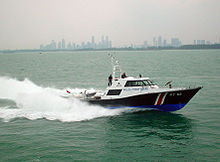 A third generation Patrol Craft of the Police Coast Guard conducting a sea-rescue demonstration off the southeastern coast of Singapore.
A third generation Patrol Craft of the Police Coast Guard conducting a sea-rescue demonstration off the southeastern coast of Singapore.
In Singapore, the Police Coast Guard (PCG) is an operational department of the Singapore Police Force. Functions of the coast guard were transferred from the Republic of Singapore Navy to what was then the Marine Police in February 1993.[16] The Marine Police was thus restructured and renamed as the Police Coast Guard, one of the few law enforcement organizations in the world to combine water policing and coast guard duties while remaining as a policing unit. It operates primarily as a law enforcement agency, with secondary responsibilities in search and rescue.[17]
Spain
Spain operates several coast guard agencies:
The Sociedad de Salvamento y Seguridad Marítima, also known as Salvamento Marítimo, or by its acronym SASEMAR, is the body in charge of maritime traffic control, safety and rescue operations, as well as protection of the maritime environment, but lacks any law enforcement responsibilities. The agency runs 20 rescue coordination centers (RCC), employs a staff of 1500 and operates a fleet of 19 vessels, 54 boats, 8 helicopters and 4 airplanes.
Customs and border protection functions in Spain are carried out by the Servicio Marítimo de la Guardia Civil, with a staff of 1100 and a fleet of 67 patrol vessels and speedboats.
Salvamento Marítimo operates in the four international SAR areas assigned to Spain: Atlántico, Canarias, Estrecho and Mediterráneo, covering a combined extension of 1.5 million square kilometers. During a maritime emergency, Salvamento Marítimo is responsible for the coordination of other possible responders, like the Spanish Navy or the Servicio Aéreo de Rescate [2], that comprises squadrons 801, 802 and 803 of the Spanish Air Force.
Sri Lanka
In Sri Lanka, until 2009 a Coast Guard Unit existed under the Ministry of Fisheries and Aquatic Resources, responsible for fishy and natural resource protection coastal areas. A new Department of Coast Guard was created under the Department of Coast Guard Bill presented to parliament in 2009. The department would be under the purview of the Ministry of Defense and be staffed by civilian personal. The department's responsibilities include search and rescue, law enforcement within the country's Exclusive economic zone, conducting anti-smuggling and anti-immigration operations, suppression of terrorist activities in territorial waters of Sri Lanka.[18]
Sweden
The Swedish Coast Guard (Swedish: Kustbevakningen) is a Swedish civilian government agency with combination of police tasks, border control, maritime rescue and environmental control. Coast Guard officers carries the same equipment and similar uniforms to regular Swedish police officers. Tasks:
- maritime surveillance and other control and inspection tasks as well as environmental cleanup after oil spills at sea
- co-ordinate the civilian needs for maritime surveillance and maritime information
- follow international development within the field and take part in international efforts to establish border controls, law enforcement at sea, environmental protection at sea and other maritime surveillance tasks.
The Swedish coast guard carries out some of its surveillance by air (from its base in Skavsta near Stockholm), and some on ice and snow (from its Luleå station). It also has marine duties in Lake Vänern, Europe's third largest lake, operating out of Vänersborg.
United Kingdom
In the United Kingdom, Her Majesty's Coastguard is purely concerned with search and rescue. It has no role in the maintenance of seamarks which is instead the responsibility of Trinity House, the Northern Lighthouse Board (in Scotland) and the Commissioners of Irish Lights (in Northern Ireland), nor has it any concern with customs enforcement, which is the responsibility of the UK Border Agency. HM Coastguard does not possess many of its own lifeboats but does have several MCA Falcons which are a type of lifeboat that are used in areas that might not necessarily have a lifeboat provided by the volunteer Royal National Lifeboat Institution, although it often wet leases commercial helicopters — mainly Sikorsky S-92s and AgustaWestland AW139s— and tugs to provide search and rescue cover in certain areas. It does, however, maintain a number of search, cliff and mud rescue teams as well as some inshore rescue boats and is a coordinating body and public face for the maritime search and rescue services. It is part of the Maritime and Coastguard Agency, which in itself is an executive agency of the department for transport.
United States of America
The U.S. Coast Guard (USCG) is both a military and a law enforcement service. It is one of the seven components of the uniformed services of the United States and one of the five elements of the United States armed forces. Its role includes enforcement of US law, coastal defense, and search and rescue.[19]
During peacetime the USCG falls under the administration of the United States Department of Homeland Security. During wartime, the USCG may, at the direction of the President, report to the Secretary of the Navy; its resources, however, are integrated into U.S. military operations (see 14 U.S.C. §§ 3–4).
The USCG maintains an extensive fleet of coastal and ocean-going patrol ships, called cutters by tradition, and small craft, as well as an extensive aviation division consisting of HH-65 Dolphin and HH-60 Jayhawk helicopters and fixed-wing aircraft such as the C-130 Hercules, HU-25 Guardian, and HC-144 Ocean Sentry. USCG helicopters are equipped with hoists to rescue survivors and also play a major role in law enforcement. The helicopters are able to land and take off from USCG cutters, making them an indispensable tool in fighting illegal drug traffic and the influx of illegal immigrants. The fixed-wing aircraft are used for long range search and rescue and law enforcement patrols.
Today's lighthouses on the United States coast are all run by the U.S. Coast Guard. The list of active light houses, lighted beacons, etc. that provide detailed information on aids to navigation with their locations and characteristic signals is currently maintained by the U.S. Coast Guard in its Light List issued each year. [20]
Uruguay
In Uruguay, the Coast Guard (Prefectura Nacional Naval-PRENA)[3] is a part of the Navy.
It is tasked with the broader enforcement of maritime laws, especially against smuggling, illegal fishing, drug trafficking and piracy. It patrols the country's coastline, and is also involved in maritime search and rescue (SAR) missions, as well as the protection of the marine environment.
Vietnam
Vietnam Marine Police (Cảnh Sát Biển Việt Nam) is part of Vietnam People's Navy and the country's coast guard service.
See also
- Chief Coastguard
- Maritime security regime
- Port security
References
- ^ http://www.mcga.gov.uk/c4mca/mcga07-home/aboutus.htm
- ^ http://www.transport.ie/marine/IRCG/CGinformation/index.asp?lang=ENG&loc=2076#gen
- ^ http://www.bdmilitary.com/index.php?option=com_content&view=article&id=110&Itemid=130
- ^ http://atlas.nrcan.gc.ca/site/english/learningresources/facts/coastline.html
- ^ http://www.ccg-gcc.gc.ca/eng/CCG/Mission
- ^ http://www.cga.gov.tw/EN/
- ^ http://www.kuestenwache.wsd-nord.de/index2.htm
- ^ http://www.lhg.is/english/icg/
- ^ http://www.indiancoastguard.nic.in/
- ^ http://www.genoashippingdinner.it/Interventi_Convegno/2003/Interventi/Stefanini%20-%20ICG/Directive%2095-21%20CE%20-%20PSC.pdf
- ^ http://www.mima.gov.my/mima/htmls/papers/pdf/mtaib/mmea.pdf (P13)
- ^ http://www.nzcoastguard.org.nz/
- ^ "NZ Search and Rescue – Who Does What?" (PDF). Maritime New Zealand. June 2004. http://www.maritimenz.govt.nz/publications/sar/whodoeswhat.pdf. Retrieved 2008-10-03.
- ^ http://www.defence.pk/forums/india-defence/3924-coast-guard-stepping-out-navys-shadow.html
- ^ Philippine Coast Guard website
- ^ http://www.mindef.gov.sg/imindef/resources/speeches/1998/18apr98_speech.html
- ^ http://www.spf.gov.sg/abtspf/pcg.htm#dept
- ^ Sri Lanka Coastguard to get sweeping powers
- ^ http://www.uscg.mil/top/missions/
- ^ Light List 2011 [1] accessed 3 June 2011
External links
Coast guards Argentina · Aruba · Australia · Bangladesh · Barbados · Belize · Canada · China · Croatia · Cyprus · Egypt · France · Germany · Greece · Haiti · Iceland · India · Ireland · Italy · Japan · South Korea · Malaysia · Maldives · New Zealand · Netherlands · Netherlands (Caribbean) · Norway · Pakistan · Peru · Philippines · Russia · Singapore · Sri Lanka · Sweden · Taiwan · Turkey · Ukraine · United Arab Emirates · United Kingdom · United States of America · VietnamCategories:- Coast guards
Wikimedia Foundation. 2010.

